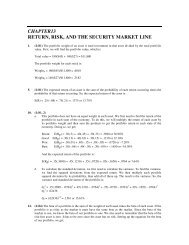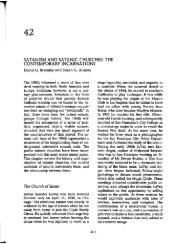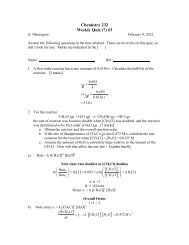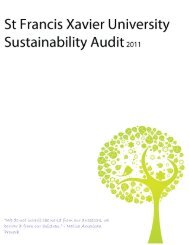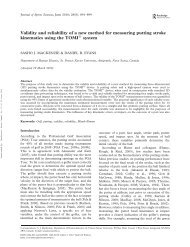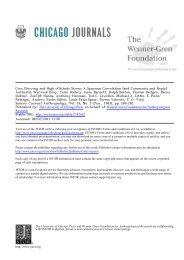ÉTIENNE GILSON AND THE ACTUS ESSENDI
ÉTIENNE GILSON AND THE ACTUS ESSENDI
ÉTIENNE GILSON AND THE ACTUS ESSENDI
Create successful ePaper yourself
Turn your PDF publications into a flip-book with our unique Google optimized e-Paper software.
Dewan: Gilson and the actus essendi<br />
It is God who is the efficient cause. It is the form which is the formal cause of<br />
esse. 75 And this doctrine will be found in later key texts. 76<br />
Indeed, Thomas regards esse more as a final cause, and the effect of all the<br />
other sorts of causality. A text of Thomas which helps to understand the situation<br />
is to be found in the celebrated De Potentia 7.2. There Thomas teaches that in<br />
God the substance or essence is identical with the esse. An objector argues that<br />
that which is signified as an effect ought not to belong to the first substance,<br />
which has no principle. But esse is such: because every being through the<br />
principles of its essence has esse. Thus, it is not appropriate to say that the divine<br />
substance is esse.<br />
Thomas’s reply shows why esse, in creatures, has to such a degree the role of<br />
an effect. He says that the order of ends corresponds to the order of agents, in<br />
such fashion that to the first agent corresponds the ultimate end, and the other<br />
ends are proportionate to the other agents. Esse, which is the proper effect and<br />
the end corresponding to the operation of the first agent must, then, have the role<br />
of ultimate end. But the end, though first in intention, is last in the operation, and<br />
is the effect of the other causes. Therefore, created esse, which is the proper<br />
of nothing? The objector reasons that the maker gives esse to the thing made. If what<br />
receives the esse is nothing, then it is nothing which is constituted in existence [esse]: and<br />
thus nothing is made. If, on the other hand, it is something which receives the esse, then this<br />
is not making something out of nothing. Thomas replies:<br />
... God, simultaneously giving esse, produces that which receives esse: and thus it is<br />
not necessary that he work on something already existing.<br />
This allows us to see that, God being posited on high as agent, we analyse his product, a<br />
being, i.e. ens, in which are found together a multiplicity of intelligible ontological factors,<br />
such as esse, form, matter, etc. I.e., only by what I would call “formal analysis” does<br />
metaphysics make sense. To see the esse of the thing as something that itself has esse and<br />
gives it to essence is to view it as an AGENT.<br />
75 In the earlier In SENT. 1.8.1.2.ad 2 (ed. P. Mandonnet, Paris, 1929: Letheilleux, p. 198),<br />
St. Thomas himself seems to affirm that esse is the formal cause of the being. At least, to<br />
an objector who says that the esse of creatures must be “through itself” and thus not caused<br />
(and consequently the esse of creatures is God himself), Thomas replies:<br />
... created esse is not through something else, if the word “through” expresses the<br />
intrinsic formal cause; on the contrary [immo], through it [ipso], formally, the<br />
creature is ...<br />
If, in this passage, esse is not explicitly called a “cause,” still it is strongly implied that it<br />
is the intrinsic formal cause.<br />
76 Cf. e.g. CM 4.2 (Cathala #558). See my papers “St. Thomas, Metaphysical Procedure,<br />
and the Formal Cause,” in The New Scholasticism 63 (1989), pp. 173-182, and “Saint<br />
Thomas, Form, and Incorruptibility,” in Jean-Louis Allard (ed.), Etre et Savoir<br />
(Philosophica 37), Ottawa, 1989: Les Presses de l’Université d’Ottawa, pp. 77-90.<br />
95



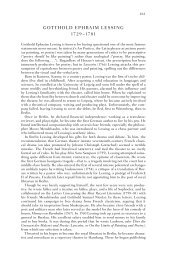
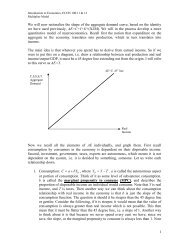
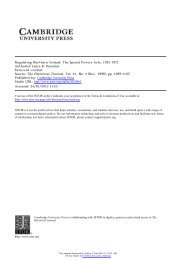
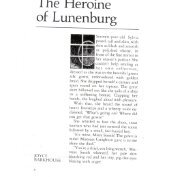
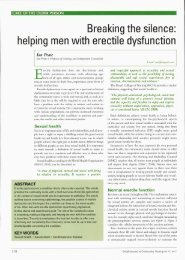
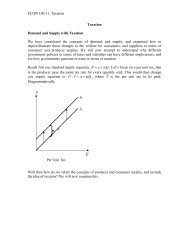
![The Rink - Cyril Dabydeen[1].pdf](https://img.yumpu.com/21946808/1/155x260/the-rink-cyril-dabydeen1pdf.jpg?quality=85)

